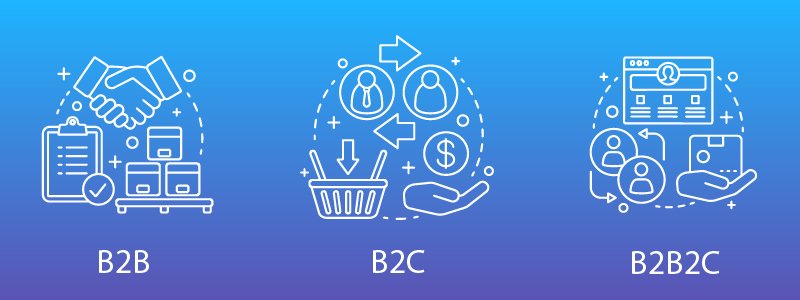Launching a startup used to mean choosing B2B or B2C — the B2B2C model, however, presents a third option. What is BCB2C, though, and how does it work?
Determining the best business model for your startup means taking multiple factors into account. Many business plans fail to take into account all relevant variables, such as the longevity of a business, the presence of competition in a market, and the nature of the product or service the business offers.
Traditionally, startups are confronted with the choice of either targeting consumers with a B2C model, or other businesses, with a B2B model. The rise of the B2B2C model, in which a business sells products or services to consumers via another business.
The logic that drives the B2B2C model is that if a startup can’t gain direct access to consumers, it will access them via another business. Which business model is right for your startup, though? We’ll proceed to break down the key differences between B2B, B2C, and B2B2C businesses.
B2C: Business to Consumer
Businesses that adopt the the B2C (business to consumer) business model focus on selling products or services directly to consumers. B2C startups enjoy flexibility in the way they are able to bring their product to market, as consumer demographics are accessed via a broad spectrum of marketing collateral and platforms.
However there are a number of factors that should be considered by prospective B2C startup entrepreneurs. B2C startups that sell products to consumers incur a variety of startup costs that include warehousing, design, supply chain operations, and marketing costs.
While launching a B2C startup provides entrepreneurs with full control over every element of their business structure from manufacturing to consumer, the sheer amount of choice in marketing avenues available means that a startup must perform extensive research in order to identify the right channel for reaching its target audience.
Successful startups aim to identify and dominate a niche in which there is as little competition as possible. The B2C market is, in most cases, wholly globalized — when entering the B2C marketplace, a startup must contend with global competition.
B2B: Business to Business
B2B businesses adopt a business-to-business model in which they sell products and services to other businesses. Examples of B2B businesses include CRM software systems that are sold to businesses like Salesforce, the sale of office furniture or industrial equipment, or services such as security.
Most startups operating with in the B2B space are service-based companies, as opposed to product-based companies. Product-based B2B companies need to purchase and warehouse stock, which multiplies startup capital requirements and risk. The key to startup success is adaptability and flexibility — the slow-moving nature of product-based business means that most startups opt for the agility offered by service-based business.
Service-based B2B startups may take the form of marketing consulting or cloud software solutions, for example. Both of these businesses benefit from the ability to rapidly adapt to market shifts and integrate new services that increase profitability at minimal expense.
B2B2C: Business to Business to Consumer
The B2B2C (business to business to consumer) business model can use a fusion of the B2B and B2C models that overcomes one of the biggest difficulties experienced by B2C companies — accessing consumers.
Using a B2B2C model, a business will sell a product or service to another business and leverage the access to consumers that the second company already possesses. The B2B2C business model relies on a close partnership between the first business and second business, and is designed to slowly build a dedicated consumer base for the first business over time.
- A B2B2C startup has four key features:
- A B2B2C startup is not a white label. Businesses that white label products and services are never recognized by the target consumer demographic, and are thus B2B businesses.
- B2B2C startups have direct access to consumer data. The ability to access consumer data is critical for any B2B2C startup seeking to capitalize on network effects and scale — more data means better, more accurate services and products.
- B2B2C startups gain brand recognition over time. The services provided by a B2B2C company may be delivered or marketed by a second business, but the target consumer demographic associates them with the original company that supplies them.
- B2B2C startups are based on mutually-beneficial relationships. B2B2C companies benefit from access to consumers, while the second business in a B2B2C relationship benefits from price convenience, expanded service or product offerings, and an minimal-investment economic opportunity.
Key Takeaways
The B2B2C business model is worth considering. B2C startups are faced by the challenge of entering a highly competitive market, while B2B companies must overcome a slow enterprise sales pipeline and can struggle with lead generation over the long term. B2B2C startups, however, benefit from the network effects delivered by partnering with an existing business, building a loyal customer base over time.
Determining how to structure your startup can be a complicated process. For comprehensive guidance on launching your startup and the fastest road to a healthy balance sheet, reach out to Fullstack today.
Was this article helpful?
Related Posts
- Small Business Grant
Been hiring recently? You’ll be pleased to note that the NSW government is keen to…
- Crypto Trading as a Business 101
Cryptocurrency trading as a business in Australia can deliver some impressive benefits. Do you qualify…
- A Guide To Estate Planning For Business Owners
As fun as business may be, it is important to consider how a business may…
- Corporate Structures: Choosing the Right One
When establishing your business, what corporate structure you choose is just important as making your…
















